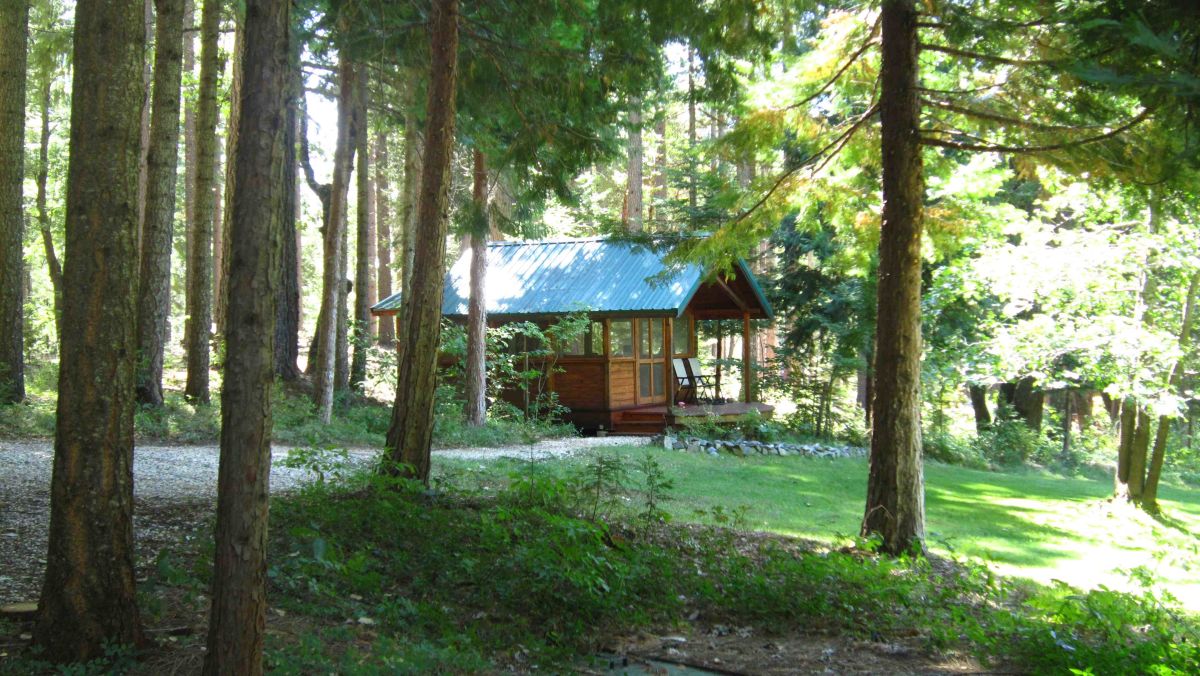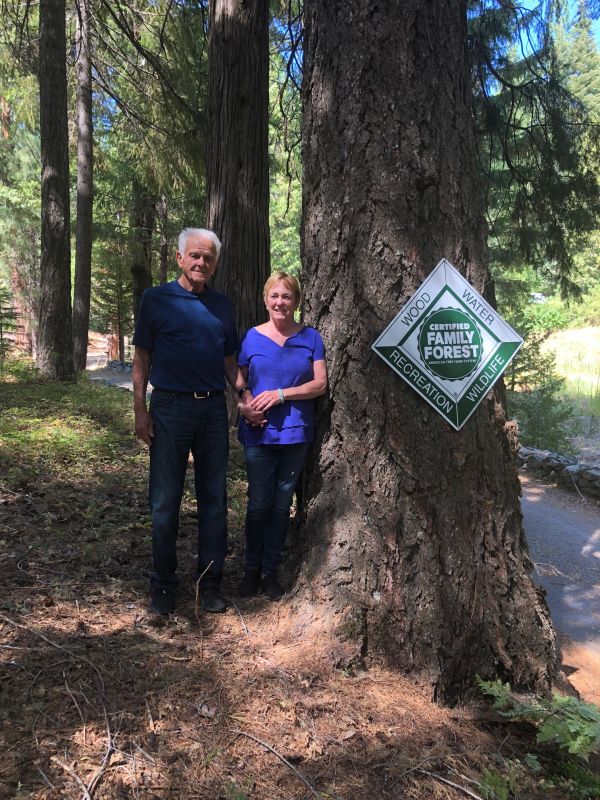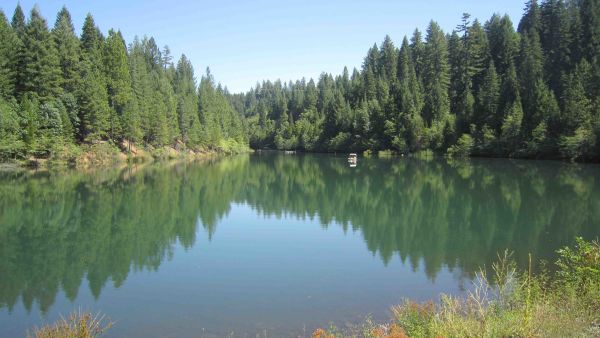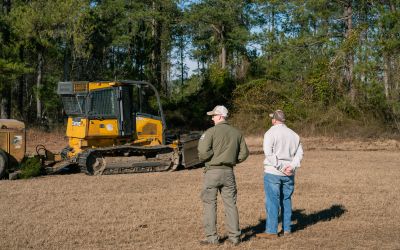The Impact of Philanthropy in Western Forests

Ron and Marianne Dreisbach had a near-miss with disaster last fall. The massive North Complex fire, which killed 16 people and destroyed almost 319,000 acres of land in California’s Plumas and Butte Counties in 2020, came within a half-mile of their woodland property, the Grizzly Lodge. Fortunately, the fire never made it any closer to the Dreisbach’s Tree Farm, which is located in the foothills of the Sierra Mountains.
Although there have been fires in their general area before, Marianne Dreisbach admits that this close encounter was scary. But she knew they had at least one thing in their favor. For more than 30 years, years, they’ve been part of the American Tree Farm System (ATFS), managing their 540 acres in a way that protects and preserves them. As part of these efforts, they’ve cleared out across of unwanted brush and trees, significantly reducing the risk of out-of-control fires on their property.
Their work has paid off. A group of firefighters who were taking a break from fighting fires at the Dreisbach’s camp compound, told them, "If the fire comes this way, we can save this area around the compound because you have cleared it out and kept it cleared," Marianne recalled.

The Dreisbachs have also taken action to prevent fires on a larger scale. Even before the near miss, they had made a generous gift to My Sierra Woods. This program has focused on helping landowners in 12 counties in northern California mitigate catastrophic wildfire risk and restore forest health through fuels reduction (thinning of forests) and reforestation projects.
"My husband and I decided to make a charitable contribution to My Sierra Woods after understanding the kind of partnership they were creating between the family forest owners and the resources to encourage the land management needed for a family forest," Dreisbach said. "Much of the Sierras is under private ownership, and too often, the owners are unaware of methods available to manage their land or cannot totally support the financial burden. My Sierra Woods resolves that problem by helping to reach out and support the individual landowners with the resources needed for both fuel reduction and reforestation. That is a win-win for the private owner and the broader community in California."
Managing Grizzly Lodge
The forest lands that the Dreisbachs have worked so hard to protect have been in Ron’s family for more than 100 years. "My husband’s grandfather bought the original parcel of land in 1910. He had the first sawmill out there," Marianne said. "Then my husband’s father, who was also a logger, purchased the Grizzly Lodge portion of the property around 1942. He provided the poles for docks for World War II. He also had a logging camp out there, where the current cabins are now."
“My husband and I decided to make a charitable gift after understanding the kind of partnership they were creating between the family forest owners and the resources to encourage the land management needed for a family forest" - Marianne Dreisbach
Ron spent a lot of time on the land while growing up, and he and Marianne lived there full time for seven years when their children were young. Even after they moved to the San Francisco Bay area, they spent their summers at the Grizzly Lodge. They enjoyed the woods, the lake, and living at the family compound, which includes several sleeping porches and a central cook cabin. (They also have a house that’s close to the highway, but they don’t stay there much.)
Marianne Dreisbach became interested in forest management in the late 1970s. When a member of the California Department of Forestry called and asked them to participate in what was called the California Forest Improvement Program (CFIP), she got involved because "I was in the middle of nowhere with a bunch of land and with nothing to do," she said.
But it didn’t take long for her interest and her passion to grow. "The person in charge of our area was very knowledgeable, and he took me around and taught me a ton about how to manage the land. I became a tourist through my own forests," Dreisbach said.
"The whole forest area around Clipper Mills was cut pretty heavily in the 1930s and 1940s, and back then, you never planted trees. So, what grew back was a lot of tanoaks. Through the CFIP program, we cleared the tanoak and planted conifers," she said. Today, their property is heavily planted in Douglas fir and Ponderosa pine, with a little bit of cedar as well.
Dreisbach developed her own very successful planting method, using all-female crews and paying them by the hour. (She had noticed that the men paid by the number of trees planted would throw away some of the saplings rather than actually planting them.) "I told the women how many we had to plant each day, and I think we had the best survival rate of anybody," she added.

The trees take about 60 years to mature. "At the time we were planting, I said we’re doing this for our kids," Marianne said. The couple have four children, Ron Jr., Linda, Sarah and Jason, who all come up with their families and spend time on the family Tree Farm each year.
Although the Dreisbachs have been involved in the ATFS for about 30 years, they were not familiar with other AFF programs until they learned about the My Sierra Woods program. Since they understood the importance of woodland management to reduce fire risk, they wanted to provide support for it.
"I think it’s a unique program; we haven’t been contacted by any state agency or any other group," Dreisbach said. "AFF was trying to get the program off the ground, and we felt that we’ve been fortunate in our lives to accumulate some financial security. We felt that it was something that we’d like to do."
Help the Work to Protect Western Forests
Excessive heat, drought, pests, and a changing climate have all contributed to increased wildfires across the West. Here at AFF, we are partnering with family forest owners, like Ron and Marianne to help them reduce their risk and help mitigate the impacts of wildfire. But, through the generosity of individuals like the Dreisbachs, AFF is working to get answers to tough questions about how to meaningfully mitigate catastrophic wildfires across the Western United States.
"AFF sees a future in which we overcome our most pressing conservation challenges, including mitigating wildfires across the Western United States. We believe that every time the vital contributions of family forest owners and their forests are valued and supported, we get one step closer to making that future a reality. But that future is only possible through the generosity of individuals like the Dreisbachs," said Bethany Mueller, Donor Relations Manager at AFF.
You can help us further mitigate wildfires by joining The Giving Tree, AFF’s monthly giving group. The Giving Tree is a group of individuals dedicated to overcoming our most pressing conservation challenges by supporting the American Forest Foundation and family forest owners by making a monthly sustaining gift. "Particularly as we look at the increasing size and intensity of wildfires, it is evident that there is a real need to scale wildfire mitigation across the Western United States. At AFF, we are working diligently to develop scalable, replicable solutions to mitigating wildfire risk," said Mueller. "These complex challenges can’t be solved by any single group acting in isolation, and a great deal of this work relies on philanthropic support from people like the Driesbachs and those of the Giving Tree to explore solutions and test strategies."
But, through the generosity of individuals like the Dreisbachs, AFF is working to get answers to tough questions about how to meaningfully mitigate catastrophic wildfires across the western United States.
The Giving Tree was created in early 2021 as a way to grow the desire for individuals to make a more sustaining impact while addressing the need for AFF to have dollars to utilize in order to identify, research, and develop new solutions to overcome our most pressing conservation challenges. "In just the past several months, the Giving Tree has increased tremendously in size. We’re seeing a lot of interest from individuals who want to be a part of the solution to addressing these really complex conservation challenges, and we’re excited to see what the future holds!" said Mueller. "It’s really exciting to see people raising their hands, wanting to contribute to this timely and critical work, particularly given the past few record-breaking and devastating fire seasons."
When you make a recurring monthly gift, you are joining others in creating a meaningful and sustaining impact that will help unlock large-scale solutions to issues like wildfire mitigation as well as the other pressing conservation challenges across the U.S.
Your monthly gift is crucial to creating a steady, reliable source of funds that allow us to deliver meaningful conservation impact, such as empowering family forest owners to mitigate wildfires and creating scalable solutions to address the changing climate and catastrophic wildfire.
Your monthly gift is an easy and convenient way to make a big impact! And it’s flexible: You can cancel or change your pledge any time you wish simply by notifying us.
With your generous monthly gift, you will receive benefits such as:
Curated and customized communications
Members-only phone line for personal inquiries, concerns or questions.
Annual choice of AFF gear such as hats, water bottles and more∗ When you make a monthly gift (at least four consecutive monthly gifts of at least $25), you will receive a limited edition AFF hat!
Your support is crucial to ensuring that the vital contributions of family forest owners and their forests are valued and supported. With your help, we get one step closer to the kinds of conservation outcomes we need for our collective future.
Related Articles

April 23, 2024
Turning Farm to Forest: Growing Loblolly Pine with Field to Forest
Wade Rabun has been working his land for years: he has most recently become the steward of a growing loblolly pine forest after enrolling in Field to Forest.

April 2, 2024
Georgia Landowner Grows Pines for Profit with Field to Forest
The Family Forest Carbon Program’s Field to Forest project is available to Georgia landowners who own 40+ acres of pasture or row crops.

February 20, 2024
For Conservation, Climate and Grapes
In Allegany County, you can spot newly planted grapevines. To the Trezise family, Kevin, Rene, and their son Bryce, this is the site of their future farm and vineyard.